Past Events
Interested in Cotsen events? Sign up for our mailing list.This workshop will provide participants with first-hand experience of the complete process of creating, importing and interacting with 3D digital assets in collaborative Virtual Reality. Photogrammetric and LiDAR scans of archaeological contexts and artifacts will be used to walk workshop participants through the process of creating collaborative research spaces in the Metaverse. Metaquest Virtual Reality headsets will be available on site for a limited number of participants. This hybrid workshop will take place in person, online over Zoom, and partially on Spatial.io, a web-based metaverse platform that allows participants to engage with content in Virtual Reality, Augmented Reality and through their web browser on desktop and mobile devices. Registration is required to be granted access into the virtual presentation space. Those with access to Metaquest Virtual Reality headsets of their own are welcome and encouraged to attend as fully immersed participants for those sections of the workshop. Space is limited to 30 participants; prior registration is required. Registered participants will be contacted closer to the presentation date with detailed instructions and a Zoom link for those joining remotely.
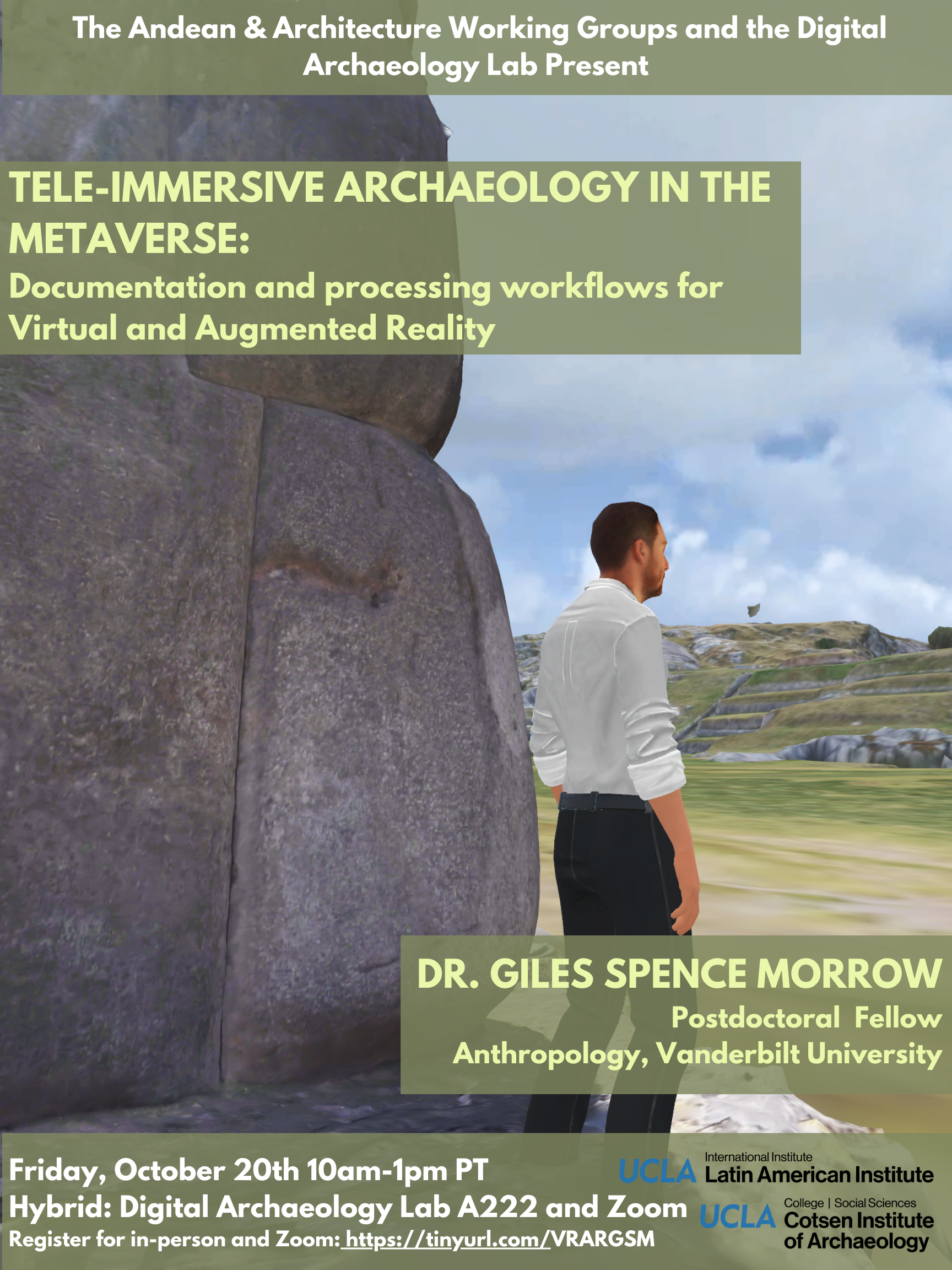
Contact Rachel Schloss
Email rachelschloss@ucla.edu
Phone
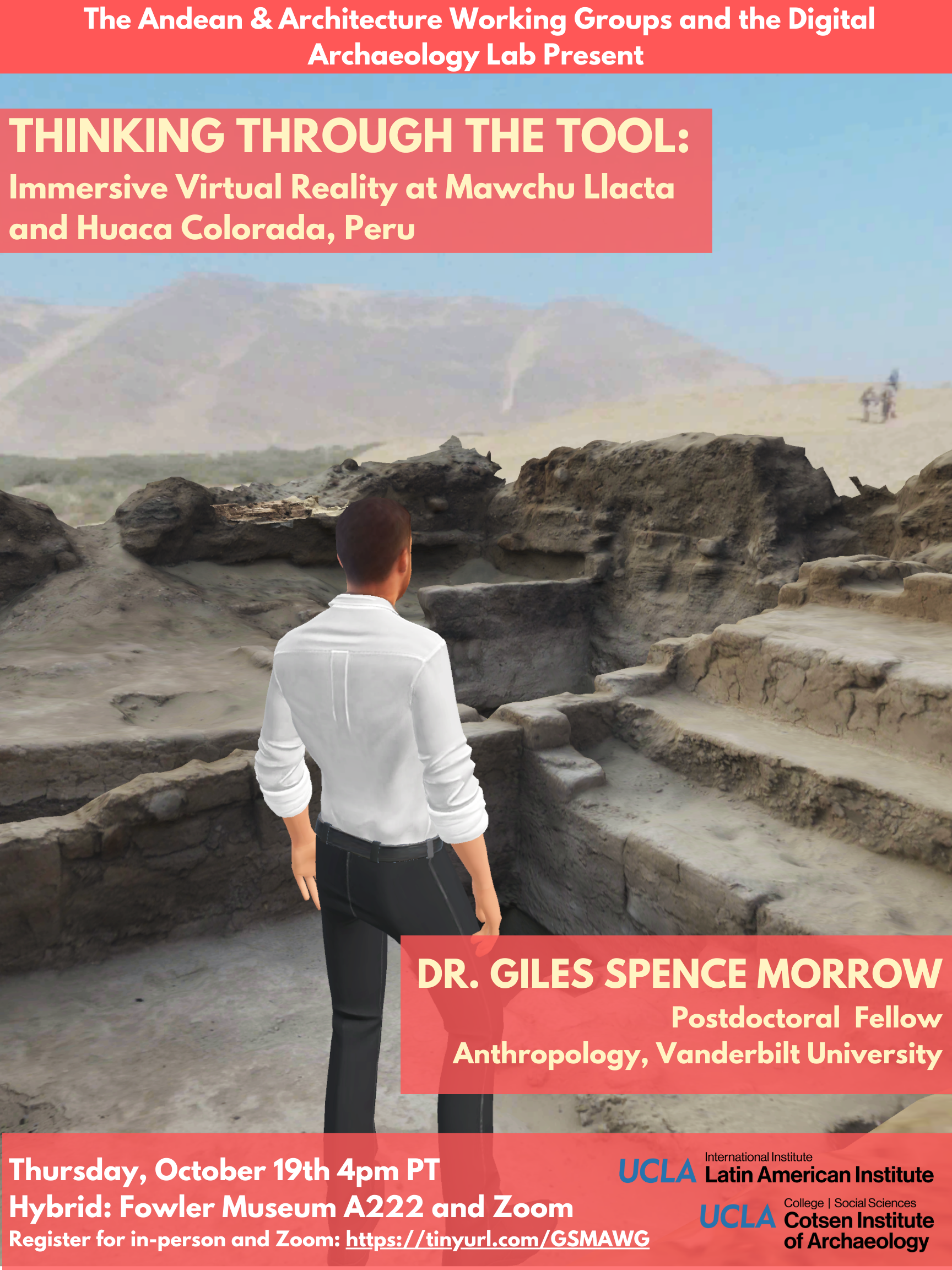
Contact Rachel Schloss
Email rachelschloss@ucla.edu
Phone
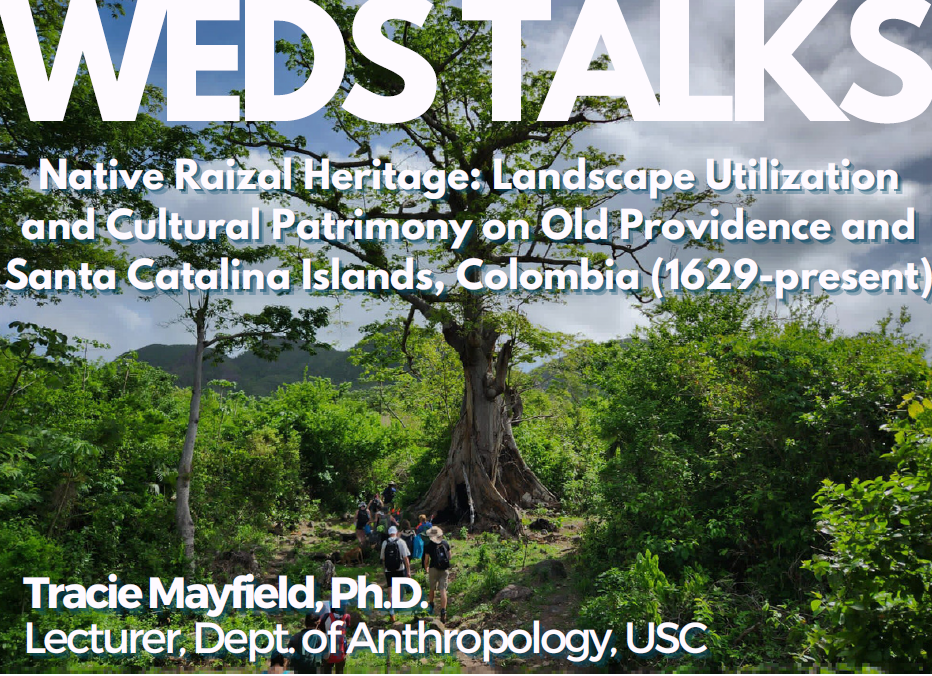
ABSTACT: The islands of Old Providence and Santa Catalina, located 130 miles off the coast of Nicaragua and around 8.5 square miles in size, have been a center of global trade, resource extraction, and military action since 1629, when the English Puritan venture capitalists of the Providence Island Company —whose shareholders also held stakes in the Virginia Company. The Virginia Company was one of the first to enter the American slave market, beginning in 1619, when their ship, the Treasurer, docked in Virginia several days after the first slaves arrived on the White Lion. The Islands are still occupied by descendants of the original English Puritan colonists, enslaved Africans, and self-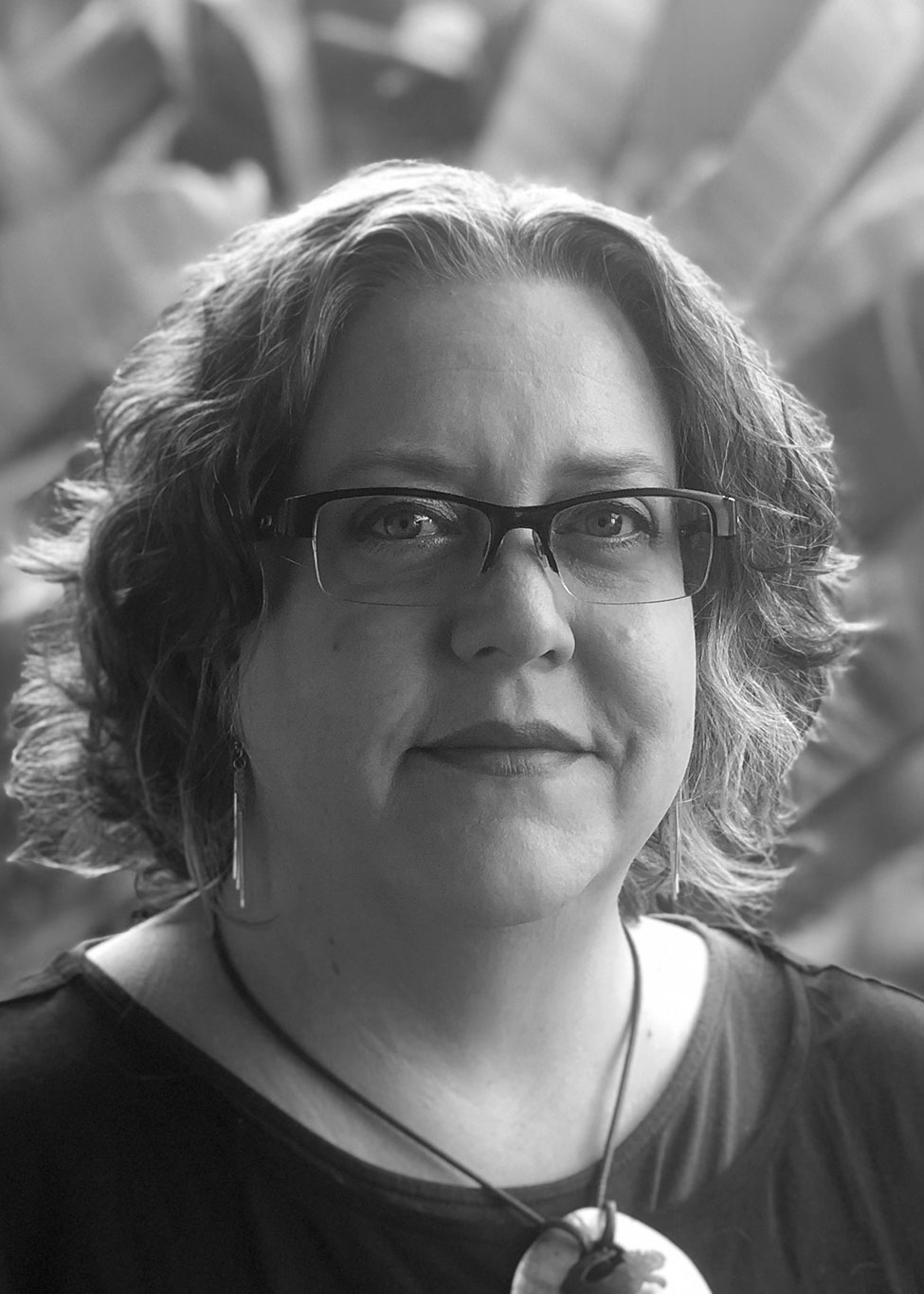 emancipated Africans, who established a coterminous Maroon colony that included peoples of Indigenous and European descent fleeing the colonial industrial complex; and who now identify collectively as Raizal. In her presentation, Dr. Mayfield explores Native Raizal heritage —both tangible and intangible— through the lens of enduring forms of landscape utilization and discrete types of cultural patrimony.
emancipated Africans, who established a coterminous Maroon colony that included peoples of Indigenous and European descent fleeing the colonial industrial complex; and who now identify collectively as Raizal. In her presentation, Dr. Mayfield explores Native Raizal heritage —both tangible and intangible— through the lens of enduring forms of landscape utilization and discrete types of cultural patrimony.
BIO: Dr. Tracie Mayfield is an anthropological archaeologist, ethnohistorian, and teaching professor with research specializations in the archaeologies of colonialism, zooarchaeology, ceramics, heritage studies, and community-led research. She is the Principal Investigator of the Old Providence and Santa Catalina Island (Colombia) Archaeological Project and Co-Director of the San Pedro, Ambergris Caye (Belize) Archaeological Project.
Contact Sumiji Takahashi
Email sutakahashi@ioa.ucla.edu
Phone 310-825-4169
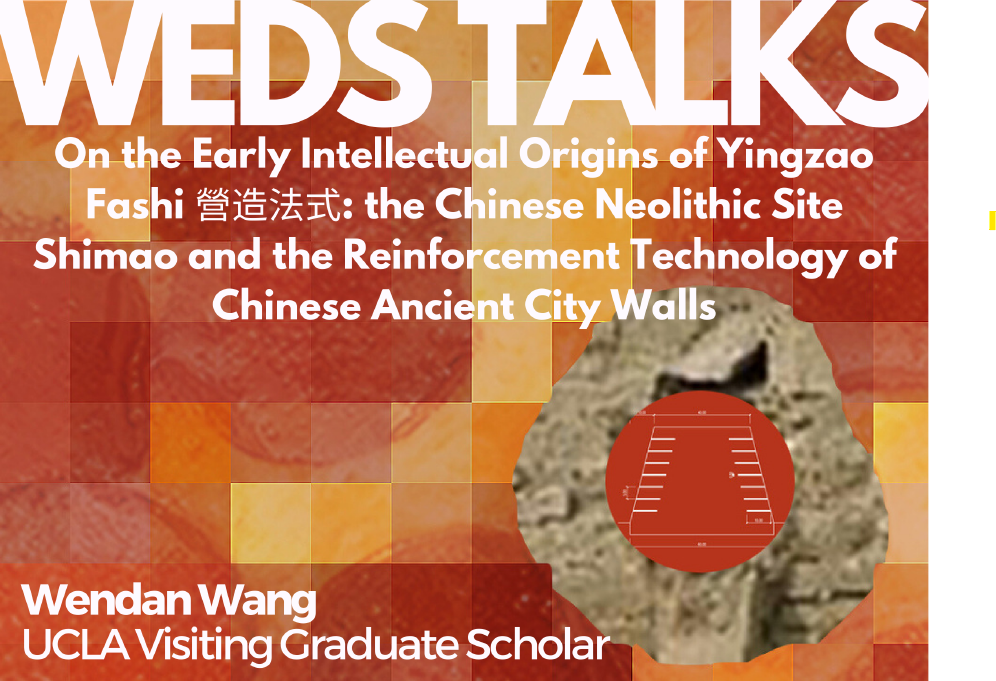
ABSTACT: Renmu (絍木 “reinforcing timber”) is a timber component that was used to build ancient city walls. It is recorded in the early twelfth-century compilation of architectural principles known as Yingzao fashi營造法式 (Principles and Forms of Architectural Constructions). Wendan is willing to share
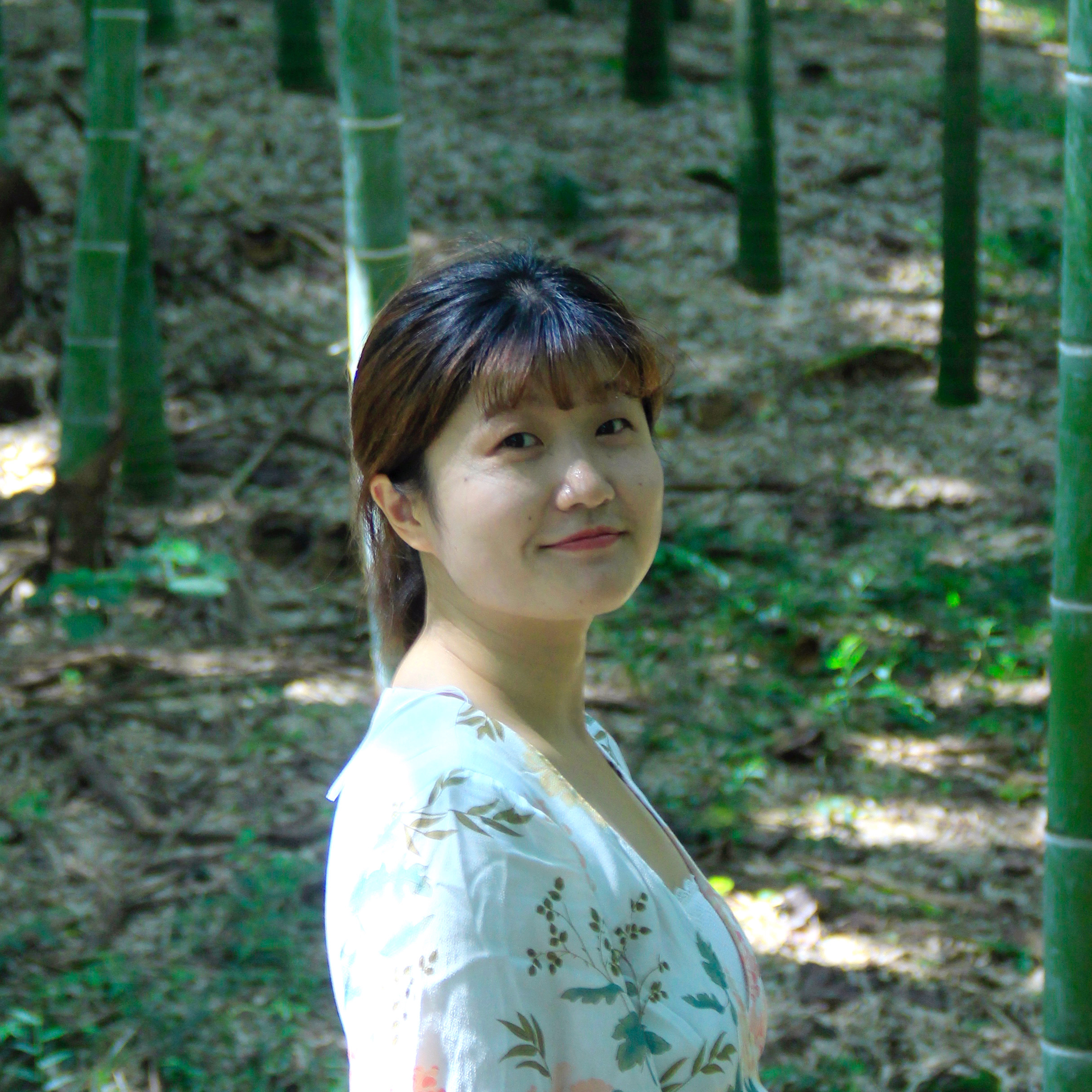
element technique, she attempts to verify the feasibility of reconstruction using the Abaqus software to analyze the overall stability of the slope in these reconstruction schemes.
BIO: Wendan Wang is from Hunan, China. She received her BA in Archaeology at Jilin University. Her next destination was Nanjing University where she was trained as an architectural archaeologist and obtained an MA. Her doctoral research will focus on Chinese buildings and settlements in the late Neolithic Age.
Renmu (絍木 “reinforcing timber”) is a timber component that was used to build ancient city walls. It is recorded in the early twelfth-century compilation of architectural principles known as Yingzao fashi營造法式 (Principles and Forms of Architectural Constructions). Wendan is willing to share her stories about how to explore renmu’s function and reconstruct its form by interpreting documents and analyzing similar remains from ancient city sites. And based on the shear strength reduction finite element technique, she attempts to verify the feasibility of reconstruction using the Abaqus software to analyze the overall stability of the slope in these reconstruction schemes.
Contact Sumiji Takahashi
Email sutakahashi@ioa.ucla.edu
Phone 310-825-4169
Glenn Wharton
Professor, Department of Art History
Lore and Gerald Cunard Chair,
UCLA/Getty Program in the Conservation of Cultural Heritage
and
Matthew H. Robb
Mesoamerican Specialist, Library of Congress
invite you to attend
UCLA/Getty Program's Distinguished Speaker Series
featuring
Gala Porras-Kim

speaking on
The weight of a patina of time
(on view at the Fowler through October 29)
Friday, October 6, 2023
11:00 a.m. PT
Live streaming via Zoom
RSVP here
Please submit your questions in advance of the webinar via email to:
hnadworny@support.ucla.edu by Wednesday, October 4 at 12:00 p.m.
Instructions to join the webinar will be provided once your registration
has been confirmed.
About the Speaker: Gala Porras-Kim (b. 1984, Bogotá; lives and works in Los Angeles/London) received an MFA from the California Institute of the Arts in 2009 and an MA in Latin American studies from the University of California, Los Angeles in 2012.
Contact
Email hnadworny@support.ucla.edu
Phone

The second Waystation Workshop focuses on the development of inclusive, collaborative, and reciprocal relationships with communities and nations of origin. The presentations, discussions, and lessons from this workshop will contribute to best practices for the Waystation and will serve to introduce concepts and terminology to workshop participants.
During three sessions across two days, we will present and discuss:
- Concepts and case studies for voluntary returns
- Consensus building with communities of origin
- Consensus building with nations of origin
- Long-term strategies for returned objects
Register here
Please complete the registration form at the link above. Once you have registered, a full program and Zoom link will be emailed to you.
Program
September 21
Welcome — Incoming Director of the Cotsen Institute of Archaeology, Jason De León
Introductory Remarks — Stephen E. Nash
3:00-3:30 pm PST/6:00-6:30 am +1 day China/Philippines
Session #1 - 3:30-5:30 pm PST/6:30-8:30 am +1 day China/Philippines
Introduction to Consensus Building & Community Engagement
Discussants – Stacie Nicole Smith and Landis Smith
Breakfast/Lunch Break - 5:30-6:00 pm PST/8:30-9:00 am China/Philippines
Session #2 - 6:00-8:00 pm PST/9:00-11:00am +1 day China/Philippines
Consensus Building with Nations and Communities
Discussants – Marlon Martin & Zhi Xiaoyong
September 22
Session #3 - 4:30-6:30 pm PST/7:30-9:30 am +1 day China/Philippines
The Stewardship Commitment: Long-Term Care of Returned Objects
Discussants: Fang Hui and Karen Eyre Moshie Ortua-Artiaga
Concluding Session - 6:30-7:00 pm PST/9:30-10:00 am +1 day China/Philippines
All Discussants and Moderators
Contact Zichan Wang
Email waystation@ioa.ucla.edu
Phone
Archaeology and anthropology were once closely related fields of research. Today, they have drifted apart. David Wengrow reflects on his book, co-authored with David Graeber: The Dawn of Everything: A New History of Humanity, which is an attempt to see what happens when you put them back together again, after a period of mutual estrangement. The results are surprising, and have significant implications across the social sciences, presenting an overall picture of human history and development that is starkly at odds with received theories and conventional wisdom.
June 8, 2023
In-person at the Lenart Auditorium, Fowler Museum
6pm Lecture
7pm Reception
Email mjacobson@ioa.ucla.edu to RSVP for the in-person lecture and reception (required).
David Wengrow is Professor of Comparative Archaeology at the Institute of Archaeology, University College London (UCL) and has been a visiting professor at New York University, the University of Auckland, and the University of Freiburg. David has conducted archaeological fieldwork in Africa and the Middle East. He is the author of three books including What Makes Civilization?, and co-author with David Graeber of The Dawn of Everything: A New History of Humanity.
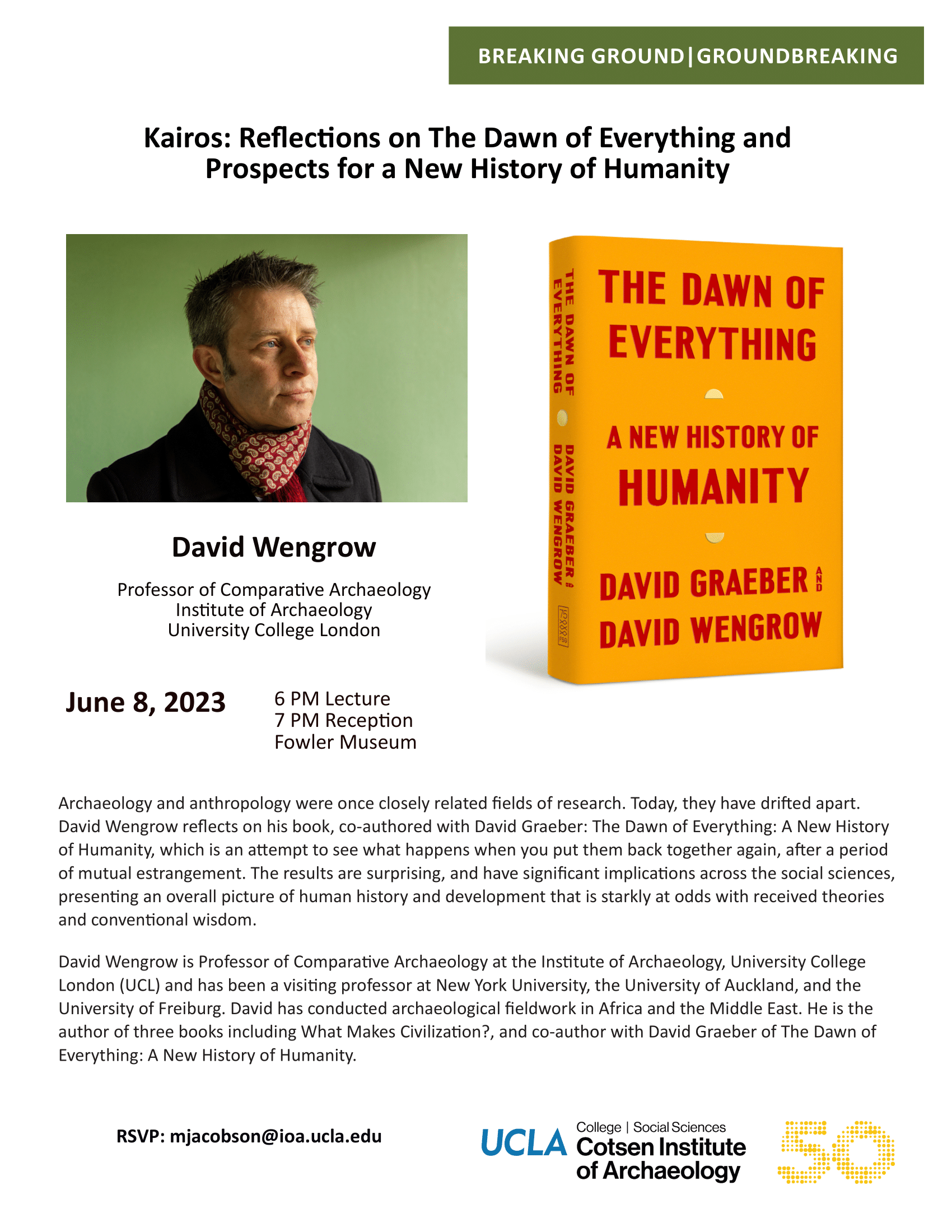
Contact Michelle Jacobson
Email mjacobson@ioa.ucla.edu
Phone
The newest publication from the Cotsen Institute of Archaeology Press, Archaeology Outside the Box, intends to make contemporary archaeology germane to the general public as well as researchers in other disciplines. In thirty-one richly illustrated chapters, a variety of projects is presented by an international group of archaeologists, anthropologists, architects, and artists. These aim to broaden the applicability of archaeology by reflecting on archaeological remains in novel ways or addressing contemporary concerns with archaeological theory and research methods. Demonstrating the fascinating and pertinent nature of archaeology, the authors go far beyond its definition as a discipline that unearths obiects of ancient material culture.
June 1, 2023
In-person at the Luskin Conference Center
6pm Lecture
7pm Reception
Online (Zoom)
6pm Lecture
Email mjacobson@ioa.ucla.edu to RSVP for the in-person lecture and reception by May 25 (required) or register for Zoom here.
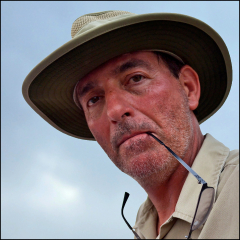 Hans Barnard has both an MD, and a PhD in archaeology from Leiden University in the Netherlands. Since 1990 he has participated in archaeological field projects throughout the world. He has published more than a hundred articles and book chapters, as well as several books, among which are the edited volumes The Archaeology of Mobility: Old World and New World Nomadism, with Willeke Wendrich; The History of the Peoples of the Eastern Desert, with Kim Duistermaat; and most recently, Archaeology Outside the Box, all published by the Cotsen Institute of Archaeology Press.
Hans Barnard has both an MD, and a PhD in archaeology from Leiden University in the Netherlands. Since 1990 he has participated in archaeological field projects throughout the world. He has published more than a hundred articles and book chapters, as well as several books, among which are the edited volumes The Archaeology of Mobility: Old World and New World Nomadism, with Willeke Wendrich; The History of the Peoples of the Eastern Desert, with Kim Duistermaat; and most recently, Archaeology Outside the Box, all published by the Cotsen Institute of Archaeology Press.
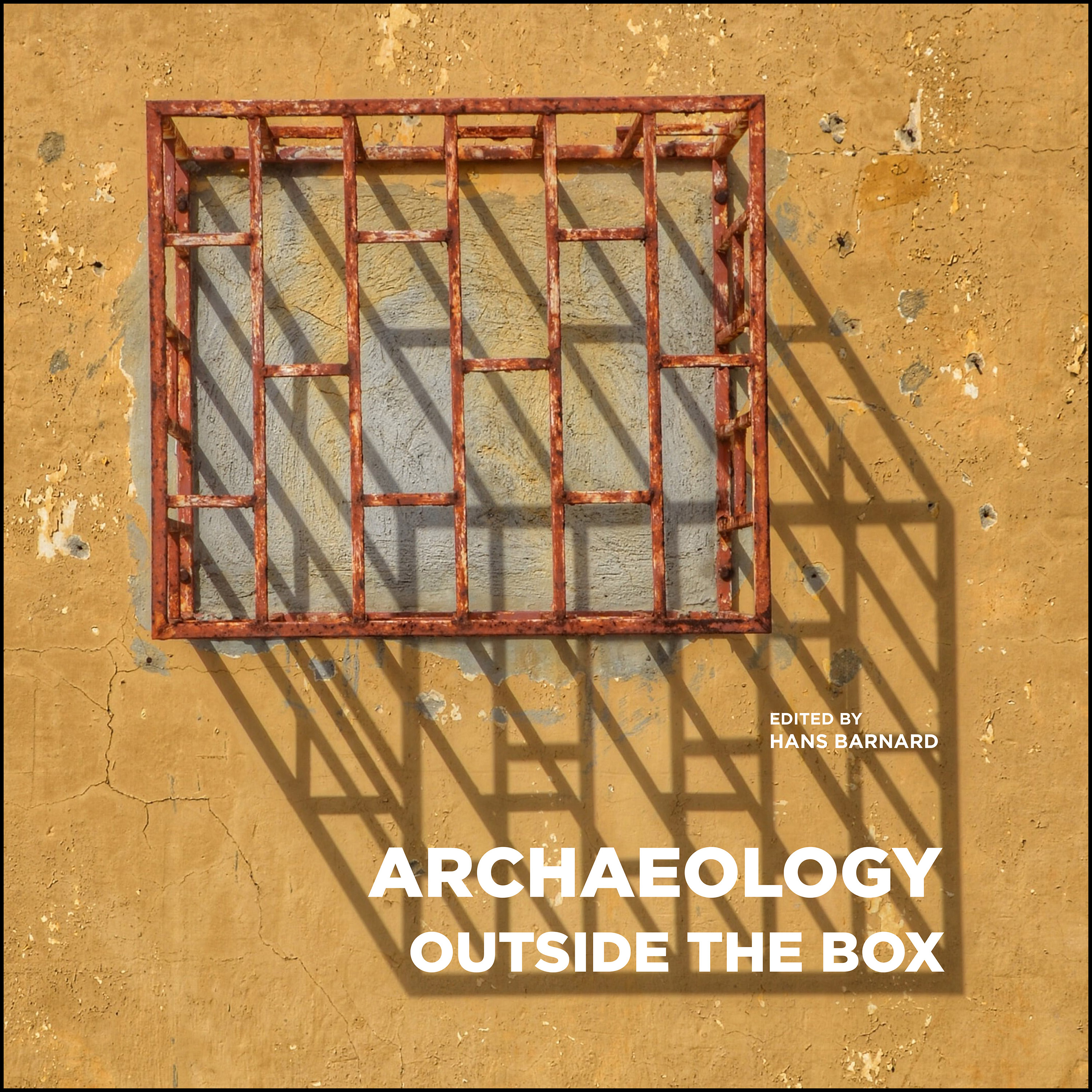
Contact Michelle Jacobson
Email mjacobson@ioa.ucla.edu
Phone
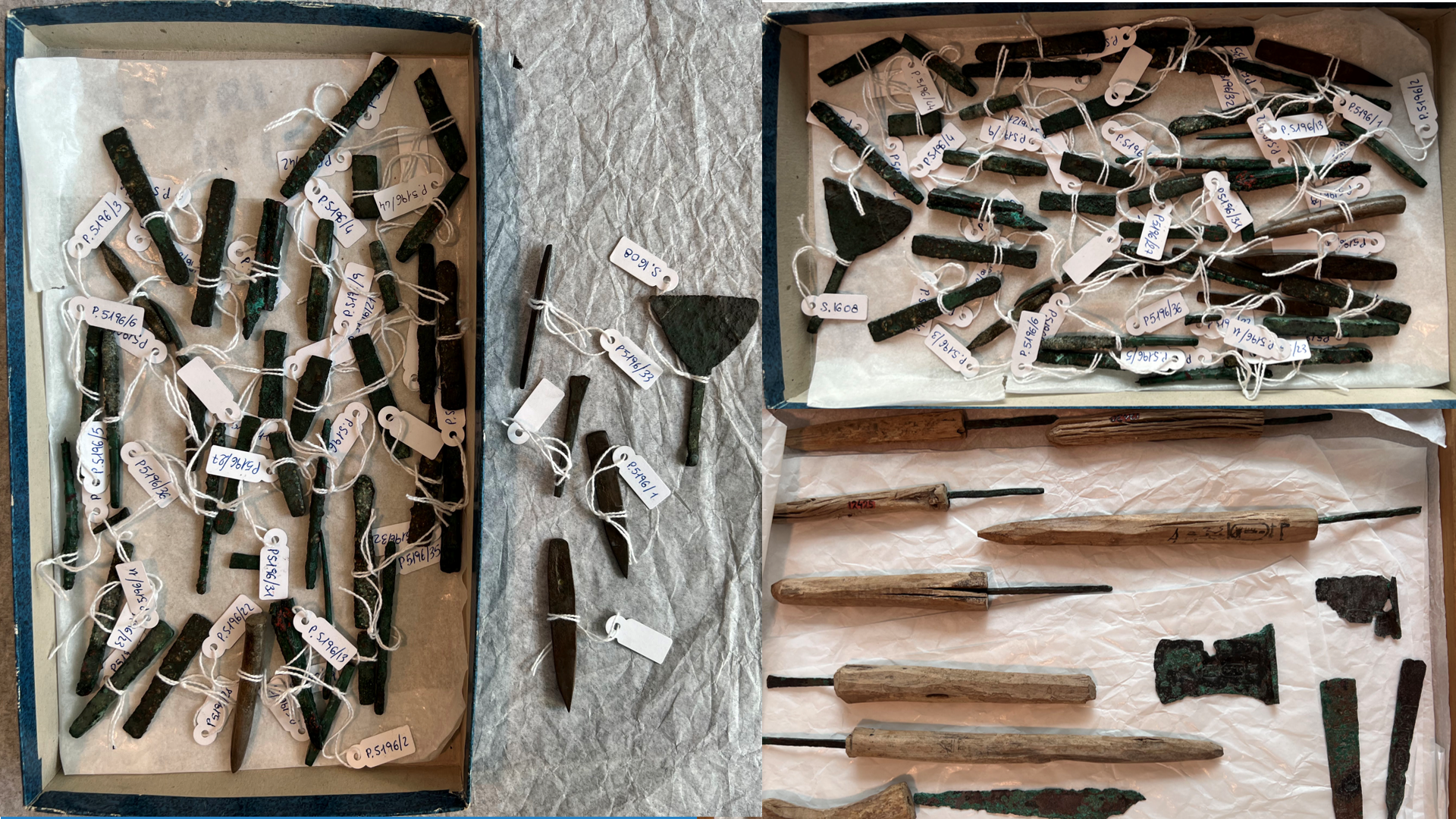 Abstract: In Egyptological scholarship, the term “model tools” has been used to characterize miniature representations of implements that have been stripped of their practical function, emphasizing their relatively “cheap” method of production. Their categorization as “model tools” was established primarily on size by Flinders Petrie in his 1917 monograph Tools and Weapons. Due to this characterization, “model tools” are either implied or exclusively said to be produced and used as a ritual object and, therefore, have no functional ability outside the ideological realm. While continued discourse on their role and function in the mortuary context has continued to reinforce their ritual purpose, metallurgical analysis allows us to problematize their confinement to the ritual sphere and further reveals the object’s life history.
Abstract: In Egyptological scholarship, the term “model tools” has been used to characterize miniature representations of implements that have been stripped of their practical function, emphasizing their relatively “cheap” method of production. Their categorization as “model tools” was established primarily on size by Flinders Petrie in his 1917 monograph Tools and Weapons. Due to this characterization, “model tools” are either implied or exclusively said to be produced and used as a ritual object and, therefore, have no functional ability outside the ideological realm. While continued discourse on their role and function in the mortuary context has continued to reinforce their ritual purpose, metallurgical analysis allows us to problematize their confinement to the ritual sphere and further reveals the object’s life history.
My paper will present a compositional analysis of Bronze Age metal tools from the collections of the Brooklyn Museum and Museo Egizio in order to re-examine the utilitarian function of “model tools” and further nuance their designation as “models”. As the majority of my corpus has an unknown provenance, my discussion will be limited to the objects’ alloy composition and how this might reflect their efficacy as utilitarian tools in the hands of craftspeople. Comparative analysis, both temporarily and contextually, allows us to explore whether an object’s function influenced alloy choice. The idea is to not only build a corpus for comparanda, but to also challenge our etic classification of objects and provide a space for debate and reconfiguration of modern categorizations.
Contact Sumiji Takahashi
Email sutakahashi@ioa.ucla.edu
Phone 310-825-4169
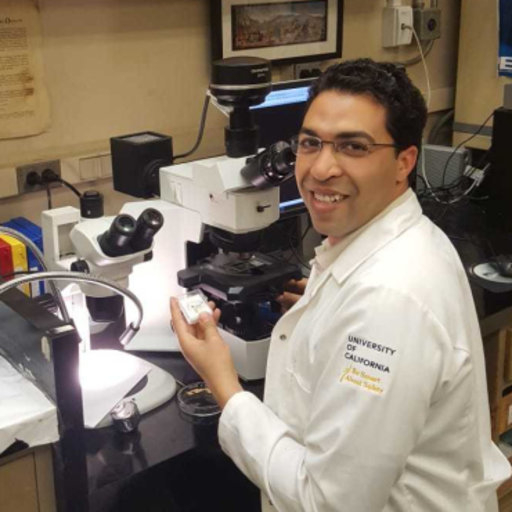 Abstract: Preservation of organic food remains from Ancient Egypt is an exceptional aspect of the archaeology in this region. The level of preservation of these materials has contributed to the early development of archaeobotany and radiocarbon dating. In this talk I will present unpublished food remains from the predynastic site cemetery of Nag ed Deir, and the New kingdom site of Deir el Ballas, in Upper Egypt. The materials were excavated in the early 1900s by George A. Reisner and Albert Lythgoe and are currently housed at the Hearst Museum of Anthropology at the University of California, Berkeley. I will discuss the results of interdisciplinary analyses applying archaeobotanical and isotopic methods to plant foods from these two sites to understand the social history of food in ancient Egypt and anthropogenic impact of climate changes on the foodways and social structures.
Abstract: Preservation of organic food remains from Ancient Egypt is an exceptional aspect of the archaeology in this region. The level of preservation of these materials has contributed to the early development of archaeobotany and radiocarbon dating. In this talk I will present unpublished food remains from the predynastic site cemetery of Nag ed Deir, and the New kingdom site of Deir el Ballas, in Upper Egypt. The materials were excavated in the early 1900s by George A. Reisner and Albert Lythgoe and are currently housed at the Hearst Museum of Anthropology at the University of California, Berkeley. I will discuss the results of interdisciplinary analyses applying archaeobotanical and isotopic methods to plant foods from these two sites to understand the social history of food in ancient Egypt and anthropogenic impact of climate changes on the foodways and social structures.
Bio: Amr Khalaf Shahat, is a postdoctoral researcher at Ancient Agriculture and paleoethnobotany lab, the Cotsen Institute of Archaeology at UCLA. He earned his PhD in Egyptian Archaeology and Paleoethnobotany from UCLA, and his Masters in Egyptology from the University of Memphis. He is interested in the study of Egyptian foodways through the analysis of plant remains from tombs and settlements and museum collections to answer questions related to cultural identities, and cross-cultural interaction.
Contact Sumiji Takahashi
Email sutakahashi@ioa.ucla.edu
Phone 310-825-4169
- ‹ previous
- 9 of 50
- next ›


